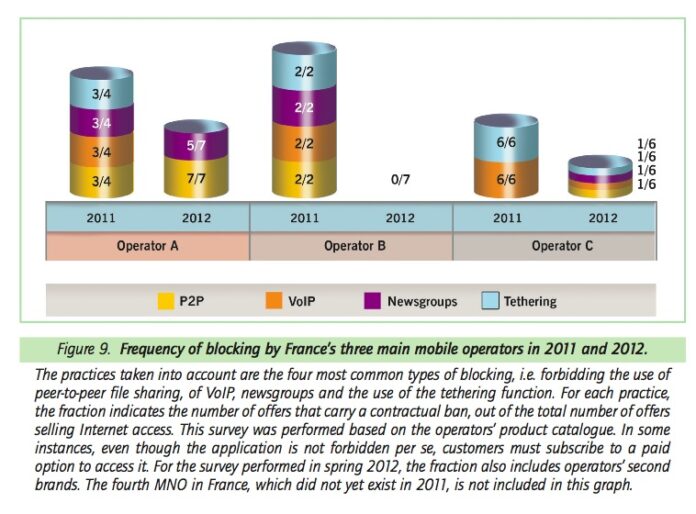Submits net neutrality report to Parliament
French regulator ARCEP has called for mobile operators in the country to cease any blocking of "OTT" and IP services, including VoIP and P2P, on mobile networks.
It says such practices are contrary to the framework it set out in 2010 to sustain a neutral and high-quality equilibrium for the functioning of the Internet.
The recommendation came as the regulator submitted its report on Net neutrality to Parliament and the Government.
Although ARCEP noted that the use of such traffic management tools is decreasing, especially on mobile networks, it still wants to see an end to them. A graph (see above, click for bigger) showed that one operator "Operator A" still has service restrictions or blocks on IP services in five out of seven internet access packages. ARCEP's report said:
"Certain practices are nevertheless contrary to the framework set in 2010 which consists of five assessment criteria. ARCEP is therefore calling, among others, for the steady elimination of service blocking (VoIP, P2P) on mobile networks. If the market fails to make sufficient progress on its own, the current legislation gives the Authority the powers needed to intervene."
The regulator also announced it would track the quality of Internet access services, adopting a decision before the end of this year that specifies quality of service indicators for fixed networks, which will be measured and made public, as already happens for mobile networks.
In parallel, ARCEP said that it is paying attention to the specific role of content and application providers and device manufacturers in the preservation of the neutrality principle. As these questions often exceed its remits, the Authority merely formulates recommendations.
ARCEP said its approach is based first on immediate, preventive actions aimed at promoting competition and transparency, and the disclosure of ARCEP's analysis of issues; second, on the ability for Internet companies, operators or content and application providers to appeal to ARCEP to settle a dispute, particularly in relation to traffic management and interconnection; and finally on ARCEP's ability to take prescriptive decisions in the case a general or discriminatory degradation of quality of service should be observed.
It is now for Parliament and the Government to determine the follow-up to be given to the report, which was produced following numerous hearings and a public consultation held in May and June 2012.


